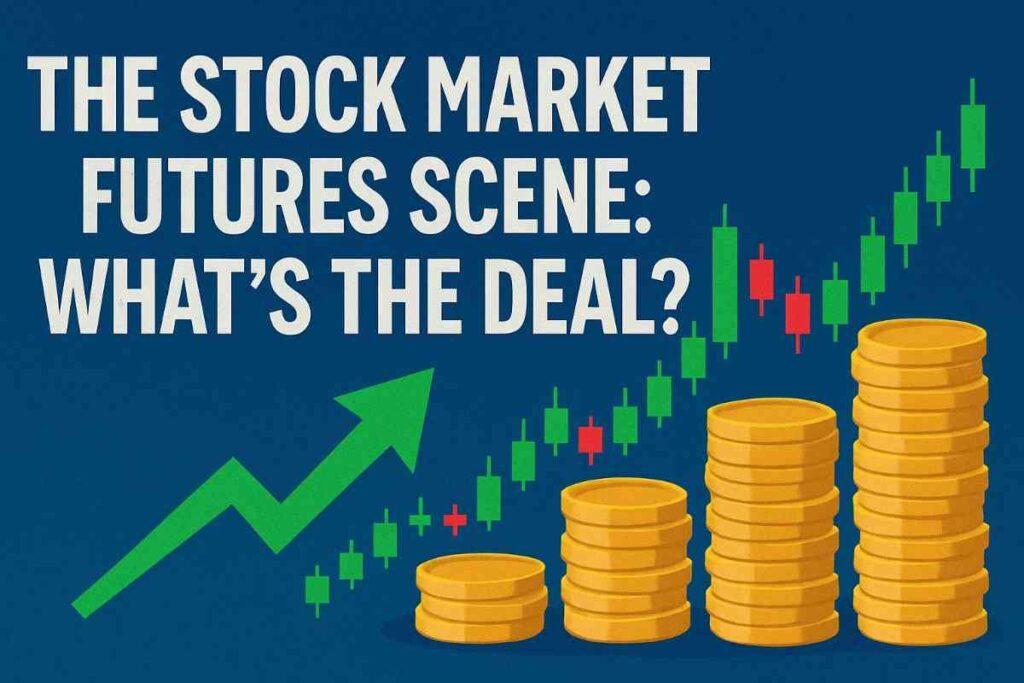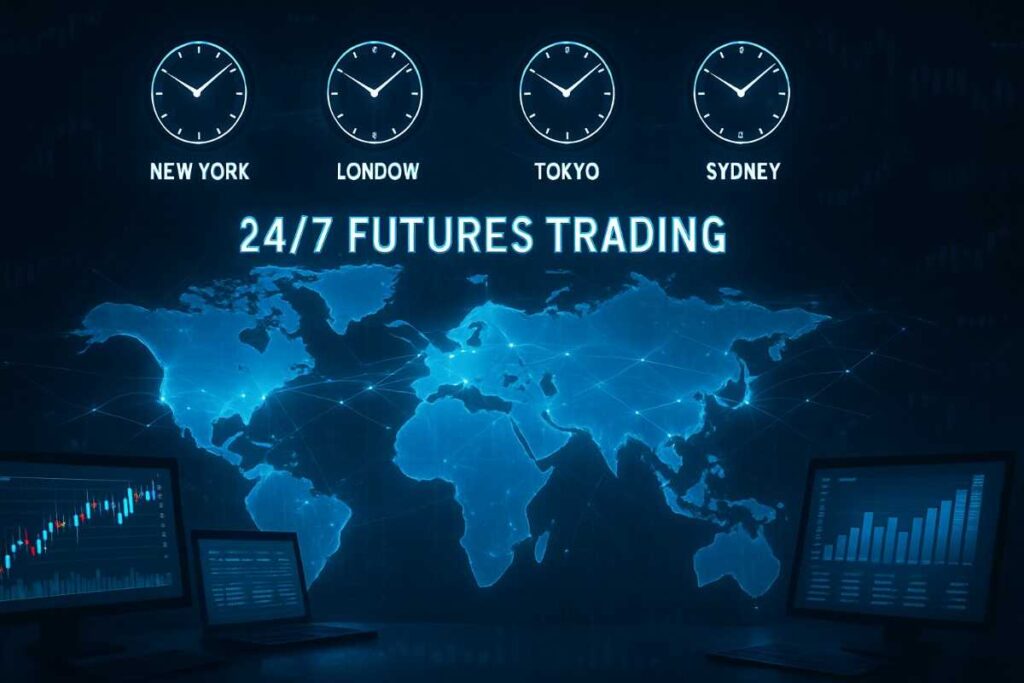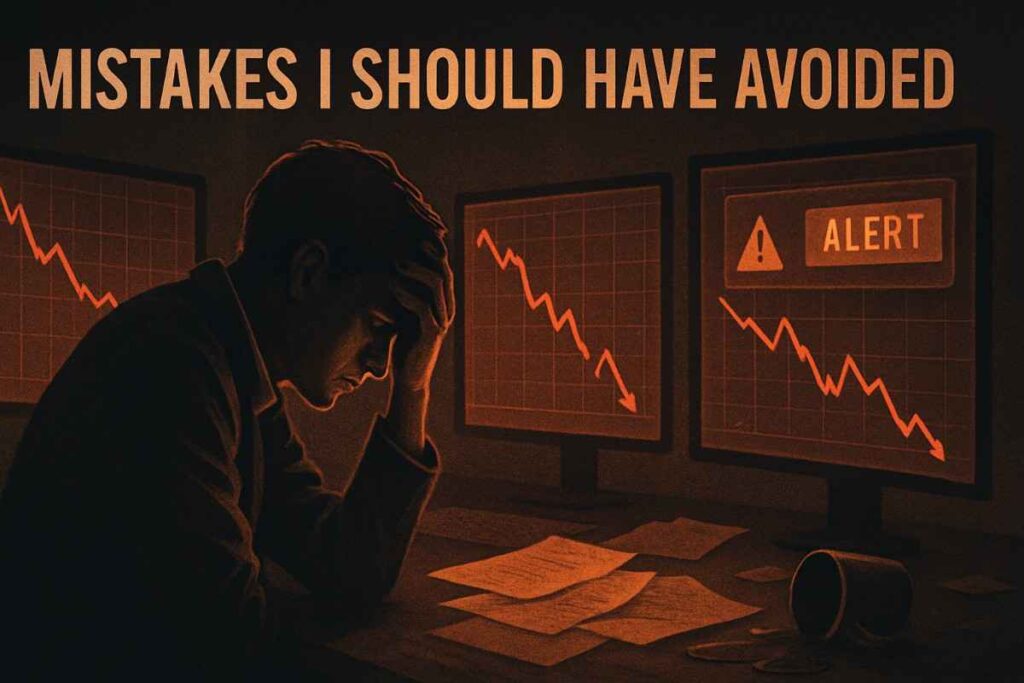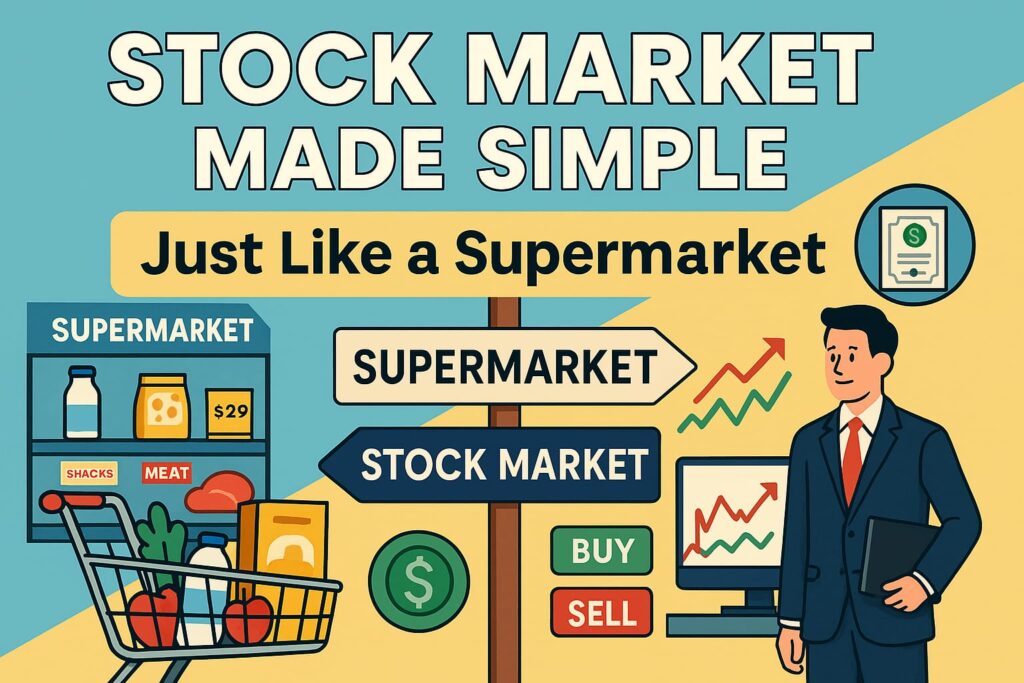How did I get into stock market futures? It wasn’t through a finance class or a Wall Street movie. I don’t remember the whole story, but I do remember this: It all started with a late-night YouTube rabbit hole and a half-eaten bag of chips.
One guy was saying he made “$500 in 20 minutes” from futures trading. And I thought, either this is a scam, or I’m missing out on something big. Spoiler alert: it wasn’t a scam. But there was no Lamborghini shortcut, either.
So let’s explore what stock market futures are, how they work, and what they mean for a beginner.

⚙ What Are Stock Market Futures?
Let’s keep it simple.
Stock market futures are a type of contract. You’re basically agreeing to buy or sell a stock (or an index, like the S&P 500) at a set price at a future date.
The twist is, you don’t actually have to hold the stocks. You’re just betting on the price movement. It’s like saying, “I think the market will go up tomorrow,” and you put your money on it.
Think of it like booking a hotel for Coachella six months in advance. If the price goes up later, you’re the winner. And if it goes down? Well, a loss is your destiny.
🧩Types of Stock Market Futures: What Are You Betting On?
Now that we know what stock market futures are, let’s understand the different types of futures that people trade.
Every trader has their own style; some prefer indexes, others prefer oil, and some prefer crypto. So here’s a crash course:
📊 Types of Stock Market Futures (Explained Simply)
| Type | What It Represents | Examples |
|---|---|---|
| Index Futures | Betting on the direction of the overall market or sectors | S&P 500, Nasdaq 100, Dow Jones |
| Commodity Futures | Trading prices of physical goods | Crude Oil, Gold, Natural Gas |
| Currency Futures | Speculating on foreign exchange rates | EUR/USD, USD/JPY, GBP/USD |
| Interest Rate Futures | Predicting movements in bond yields and interest rates | T-Bills, Treasury Notes Futures |
| Crypto Futures | High-risk trading of digital assets | Bitcoin (BTC), Ethereum (ETH) |
💥 Wait, so is this basically gambling?
This is a question every beginner trader asks: “Is futures trading gambling?”
You could say that, but… not entirely. Let me explain.
When I started, I knew nothing. No stop-loss, no technical analysis. Just coffee, YouTube, and overconfidence. I would apply whatever I heard from people. A lot of my decisions worked out, and a lot of them failed.
But as I learned, I realized that stock market futures are a serious game where strategy, planning, and risk management are essential.
So, are futures risky? Absolutely. They’re leveraged instruments, meaning you can earn (or lose) more than the money you put in.
🤔 Why Do People Trade Futures?

If you’re thinking, “Trading regular stocks is better,” that’s a valid thought. But stock market futures have a few unique advantages:
These are some of the reasons people prefer futures:
- Almost 24/7 trading: The market may be sleeping, but futures are still moving.
- Leverage: A small amount of cash can lead to a big move (but the risk is also high).
- Hedging: If you’re already in stocks, you can use futures to manage risk. It’s just like taking an umbrella when you think it might rain.
In my experience, this isn’t about greed; it’s about strategy. But yeah, it’s not for the faint of heart.
Mistakes I Should Have Avoided

If you’re new to stock market futures, keep these points in mind. I had a lot of “ouch” moments. Don’t make the same mistakes I did.
- Don’t ignore margin. If you take margin requirements lightly, your account could get wiped out.
- Always use a stop-loss. “It’ll bounce back” is the most dangerous line you can say.
- Follow the news, but don’t become an addict. Headlines do move markets. But doomscrolling won’t make you a better trader.
- Start with paper trading. It’s zero-risk practice and the best way to build confidence.
Best Tools & Platforms for Futures Trading
- Thinkorswim (by TD Ameritrade)
This is a top-tier platform for futures, offering stock market futures charts, indicators, and even paper trading. It’s user-friendly but also provides pro-level features. - Interactive Brokers (IBKR)
This is a bit more advanced, but if you’re serious about futures trading, IBKR is a beast. You get global access, margin trading, and low commissions. - Keep in mind: this is beginner-friendly, but the interface might seem a bit complex at first.
- TradingView
Do you need charts that are both smooth and powerful? Then use TradingView. It has live charts for all types of stock market futures. Plus, you can see other traders’ setups.
The free version is very useful, but you might want to consider a paid plan for real-time futures data. - Futures.io Forum
This is an active community where people only talk about futures trading. You’ll find strategy testing, trade journals, and honest reviews. This is a no-nonsense zone; you’ll only find people who want to learn, not those who are just pushing useless signals. - YouTube Channels (The Useful Ones, Not Clickbait)
- The Trading Channel
- Futures Trader 71
- Sky View Trading
- TradingView
These will give you a solid foundation without all the “Make $1000 in 5 minutes” nonsense.
If you’re serious about stock market futures in the US, these tools can build your trading toolkit. Just remember, a tool is just a tool; you still have to do the work.
My Own Example

If I remember correctly, one time I took a crude oil stock market futures contract, thinking the price would go up after an OPEC meeting.
I entered with a $300 margin, and my position went against me. I should have exited, but I thought it would “bounce back”.
The result? -$180 in 45 minutes.
The lesson: if I had set a stop-loss, I would’ve only lost $60. Emotions can be expensive. This is a game of numbers, not drama.
Quick Recap: Should You Try Stock Market Futures?
If you’re interested in stock market futures, remember this:
There is no shortcut to making money quickly. But with patience, this is a skill that can give you a long-term advantage.
Stock market futures are neither your friend nor your enemy. They just behave the way you treat them. Learn, survive, and then you’ll be able to earn.
Start with a demo account. Make mistakes, but don’t repeat them—learn from them. And talk to other traders; don’t just watch YouTubers’ setups.
In the end? It’s your money. It’s your journey. So take it slow, and ask questions. And if you ever feel like “this just isn’t making sense,” take a break. Take a breath. The market will be here today and tomorrow.
Have you tried futures trading? Or are you planning to? Share your experience or questions in the comments.
And if you found this information helpful or want to learn more about the stock market, click here.
Now for some questions that every new futures trader has at 2 a.m.:
(Bonus Tip):
Never put all your money on a strategy from a YouTube video that claims a “90% win rate“. Test, tweak, and trust only the data.
FAQ: You Ask, We Answer
Do I need to have stock knowledge to start futures?
No, but it’s beneficial. Futures are a bet on the direction, but if you have a sense of the market, your decisions will be stronger.
Can I start futures with $100?
Technically, yes; realistically, no. Futures are leveraged, but brokers allow them based on margin. For a safe game, start with $500+ or learn on paper trading.
Are overnight futures risky?
Absolutely. A tweet or a news headline can flip a position overnight. That’s why a stop-loss and risk control are a must.
What’s the difference between futures and options?
With options, you have the right (not the obligation), and with futures, you have the obligation. Futures are a direct bet; options are a bit more complex but flexible.
Can I trade futures from my phone?
Yes, but you have more control on a laptop. Mobile trading is possible (with the Thinkorswim and IBKR apps), but a bigger screen is better for analysis and execution.


Pingback: Bonds vs Stocks 2025: Why Smart Millennials Favor 3.98%